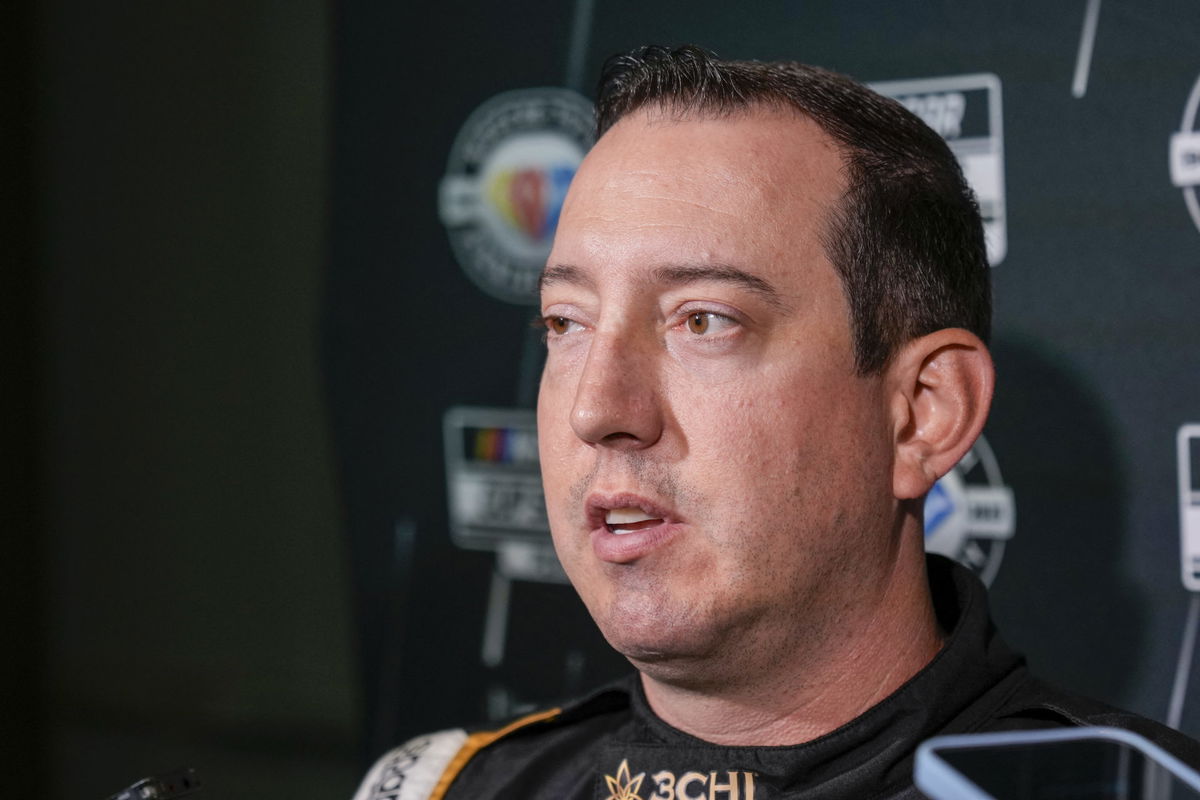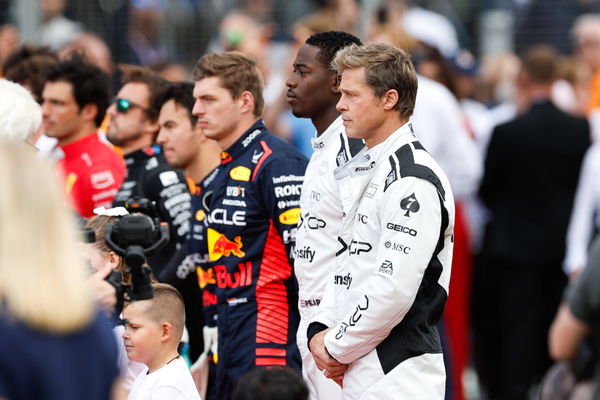
USA Today via Reuters
Aug 31, 2023; Charlotte, North Carolina, USA; Kyle Busch answers questions from the media at Charlotte Convention Center. Mandatory Credit: Jim Dedmon-USA TODAY Sports

USA Today via Reuters
Aug 31, 2023; Charlotte, North Carolina, USA; Kyle Busch answers questions from the media at Charlotte Convention Center. Mandatory Credit: Jim Dedmon-USA TODAY Sports
Back in 2012, Kyle and Kurt Busch paid the ultimate tribute to Talladega Nights by running the infamous “ME” Cougar paint scheme at Talladega Superspeedway. The brothers didn’t stop there; Kurt even quoted Ricky Bobby over the radio mid-race, fully embracing the chaos and comedy of the film. For Kyle, the movie has never been more than just a joke; it’s a touchstone.
Watch What’s Trending Now!
Whether it’s referencing Talladega Nights or dropping a Cars nod after a wild finish, Busch has long enjoyed cinematic racing. Now, with the F1 movie creating buzz last month, Busch is reflecting on what racing films get right and where they stretch the truth. As the open-wheel racing craze brings new eyes to racing cinema, Busch is once again weighing in from the heart of the sport.
Kyle Busch believes that racing movies capture 80% of NASCAR reality
The F1 movie has taken over paddocks and premieres alike. Directed by Top Gun: Maverick’s Joseph Kosinski, it lends adrenaline and artistry to spotlight the drama of the Formula One world. With Brad Pitt in the lead role and real F1 teams collaborating closely, the project has become one of the most ambitious motorsport films to date. Pitt and his co-star Damson Idris underwent serious on-track training in custom-built F2 cars to sell the realism.
The movie was shot during actual F1 race weekends, adding a layer of authenticity that fans are already praising. Seven-time F1 world champion Lewis Hamilton served as a hands-on producer, overseeing script accuracy and ensuring the paddock atmosphere felt real. This knack for high-octane visuals, especially the racing sequence, has left viewers’ hearts in their throats. And the fact that it was filmed on an iPhone is another layer that adds to its success.
But what is equally fascinating is how the movie has sparked fresh discussions among drivers themselves, including Kyle Busch. In a recent sit-down interview, when asked about his views on the amount of realism in those movies, Kyle Busch didn’t hold back. Rowdy said, “Days of Thunder was always my favorite movie. The nickname Rowdy sort of came from that a little bit. I certainly caused my own, uh, headaches, let’s say, in my younger years. But, you know, Days of Thunder was pretty real. Like, there was a lot of — you know, the crew chief talking to the car and like souping it up and getting it ready to go for the big race and all that, and then the drivers having their rivalry and hitting each other and not liking each other — like, that was all pretty real.”
For NASCAR fans and Kyle Busch, Days of Thunder overtakes all other racing movies. Fast forward three decades, and a sequel is roaring back into conversation. Now it has been confirmed by original producer Jerry Bruckheimer that Tom Cruise is expected to return as Cole Trickle, but the plot details and cast remain under wraps. NASCAR legend Jeff Gordon enthusiastically supports the project, even discussing story ideas with Tom, highlighting how modern camera tech could bring an immersive new edge to the sequel.
Moreover, Kyle Busch confessed to the realism of racing movies by addressing the F1 movie, too. He said, “And so I haven’t seen the F1 movie yet, but I’d be interested to see it. But, like, you know, there’s been some other F1 movies in the past where they were pretty good. Like, they gave you that rivalry of those two drivers back and forth, and they told the true story of them battling for championships — and then one of them obviously getting in a bad crash and, um, you know, burning and things like that. So, yeah. I mean, it’s the nature of how much you want to put into it and believe in it, but I would say, you know, 80% probably.”

Imago
PITT Brad USA, actor playing Sonny Hayes, driver of the fictional Apex APXGP team in the F1 movie by Apple Studios / Bruckheimer Films, portrait IDRIS Damson Alade-Bo GBR, actor playing Joshua Pearce, driver of the fictional Apex APXGP team in the F1 movie by Apple Studios / Bruckheimer Films, portrait VERSTAPPEN Max ned, Red Bull Racing RB19, portrait during the 2023 Formula 1 Aramco British Grand Prix, 10th round of the 2023 Formula One World Championship, WM, Weltmeisterschaft from July 7 to 9, 2023 on the Silverstone Circuit, in Silverstone, United Kingdom PUBLICATIONxNOTxINxITA Copyright: xDppi/DPPI/IPAxSportx/xipa-agencyx/xIPAxSportx 0 IPA_IPA39140644
Intriguingly, director Joseph Kosinski hinted at a cinematic crossover between Days of Thunder and F1 the movie. In a GQ interview, he floated a collision of worlds with Tom Cruise’s Trickle facing off against Brad Pitt’s Sonny Hayes in a go-kart showdown, an idea sure to capture imaginations. With the buzz around F1 and Cruise on board for more racing drama, fans might see two legends battling it out in ways only big-budget Hollywood can deliver.
But with the chatter about Days of Thunder 2 coming in, Dale Jr. couldn’t help but share his thoughts on it, as he feels the more original the cast is, the better it’ll be for the movie. And while the movies are all great in their own place, Kyle Busch actually weighs in on why NASCAR drivers would find it difficult to compete in other realms of motorsports.
Busch opens up on the potential challenges of NASCAR drivers thriving in F1
Kyle Busch’s response tackled a familiar motorsport question. Can just anyone race at the top level if they are fast enough? His answer is clear. The No. 8 driver said, “Yeah. I mean, I think it’s a feel thing. Like when you’re a race car driver and you’re going out there like you want to push the car to its absolute limits. And for me, what always sort of made me as successful as I was — like I could push it to that 100.5% line and just a little bit over the edge and yet keep it under control, where everybody else sort of lies within that 97 to 98% range. So you can get that little bit out of it. You can make a lot more hay and being able to get those wins.”
Motorsport demands far more than just raw speed. Being able to push beyond the limit as well is the razor-thin margin that separates champions from the rest.
However, the jump from NASCAR to F1 illustrates this well. NASCAR emphasizes oval strategy and close back racing, whereas F1 requires precise braking, cornering finesse, and the ability to endure extreme G-forces on tight circuits like Monaco. Where NASCAR drivers rely on mechanical grip, F1 drivers must manage high downforce, hybrid systems, and constant micro-adjustments behind the wheel. F1 cars experience much more downforce, which is what helps the car move forward due to its lower height. Even if one takes the example of IndyCar, it would vary from NASCAR’s heavy bottom structure. Busch goes on to say, “IndyCar is wide open. We gotta lift. We’re just so big and we’re so heavy and we we we don’t have downforce either.”
Whether it’s the big screen or the racetracks, driving in NASCAR or F1, one thing’s for sure: the racing spirit is alive and burning bright.








